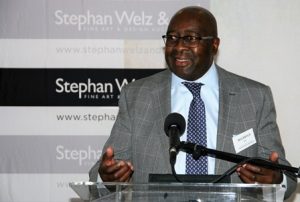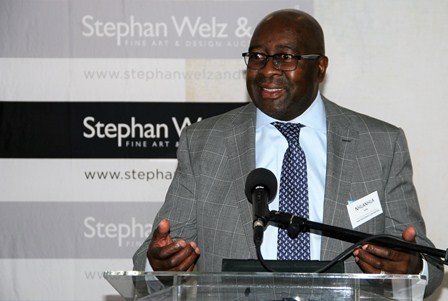
Aptly wondering out loud how long it should take for a principal to be tenured in a particular position before being promoted or demoted – ex [or axed] finance minister, Nhlanhla Nene, someone who’d know better about such a “tragic” state of affairs, addressed a breakfast gathering at the Killarney Country Club – a mere day after yet another cabinet reshuffle of the Zuma administration – equally aptly, titled making sense of South Africa.
Considered by the general public to be the first Black South African to hold the office of Minister of Finance, Nene’s axing from the crucial portfolio caused markets to react extremely negative whilst seeing the rand plunging by as much as 5.4 percent against the dollar in a single day, at the tail end of 2015.
Previously a deputy minister of finance, he had been appointed as minister of the department by President Jacob Zuma on 25 May 2014 and removed on 9 December 2015.
Hours after yet another of the Zuma era cabinet reshuffles, which Nene quipped that it consequentially forced him to tweak his initial speech draft for the Stephan Welz & Co-hosted event – the man once hailed by financial analysts as a good finance minister who criticized several government spending plans such as that of building several nuclear plants – stood in front of an early morning audience comprising a fair smattering of Jewish guild representatives and socialite Edith Venter – amongst concerned and interested others.
“South Africa is a small and open economy, which depends for its sustenance and prosperity on its strong linkages with the rest of the world”, Nene begun his address adding that as a very young democracy too, both features came with their own set of challenges.
“South Africa’s deep linkages with the global economy are a deep source of sustenance.
We are a small market and therefore need the rest of the world to sell our goods and services to. And by the rest of the world I include the rest of the African continent which has in recent years been a growing destination for our manufactured goods, absorbing a lot of the slack in European demand, for example, for our manufactured exports”, one of the ANC’s most educated cadres, opined.
Pointing out that the country’s economy hasn’t responded well to the improvements in global growth, Nene argued that South Africa’s growth trajectory has somewhat delinked from global growth patterns – further alerting the attendees to the IMF’s recent assessment of our country, that South Africa’s vulnerabilities have become more pronounced and are set to increase further unless the pace of economic growth picks up.
Mentioning areas of the IMF’s conclusions, he touched on the following:
- Low growth has taken a toll on the state of the public finances, increasing government debt;
- The public sector’s balance sheet is also exposed to sizable contingent liabilities from state-owned enterprises (SOEs);
- Weakening governance and uncertainties regarding the direction of future economic policies, partly related to the electoral calendar, have also adversely affected consumer and investor confidence;
- South Africa is exposed to significant financing risks arising from the fact that the country’s large gross external financing needs are financed mainly by portfolio flows;
- Among the positives for South Africa are its freely floating exchange rate, corporate resilience to sizable exchange rate depreciation during the past few years, and high share of government debt which is denominated in the local currency.
- External and domestic factors could result in significant shocks to the economy, whose effects could be amplified by linkages among the real, financial, and fiscal sectors, especially if accompanied by further downgrades of local currency sovereign credit ratings to below investment grade.
The bespectacled economist now strutting his stuff in the private corporate space, cutting an image of urbanity in a crisp two-piece executive suit continued on to touch on the fact that challenges emanating from the global environment as well as South Africa’s domestic factors demanded that the state not only developed but implemented, with a sense of urgency and vigor, economic and social policies that will lift the speed at which the economy could grow.
“As the Governor of the South African Reserve Bank pointed out recently, the road on which our economy runs is too narrow and has too many bends. If the car, the economy that is, is to run faster, we must widen and straighten the highway”, he hinted.
Structural problems, including infrastructure bottlenecks, skill mismatches, and harmful insider-outsider dynamics, have conspired to keep unemployment and inequality unacceptably high- he insisted, further going on to emphasize that the success with which South Africa was able to address its domestic challenges would have a greater bearing on how successful the country was in taking advantage of global opportunities.
“Relative to where we were in 1994, we have made significant progress. Though it has slowed down to a snail’s pace, our economy remains bigger than it was in 1994. We have expanded access to public education and health. More houses have been built. We have built more social and economic infrastructure”, the former MP pin-pointed.
The economy simply hasn’t created enough jobs to absorb the ever-growing queue of job seekers, leaving more than 27% of fellow South Africans unemployed, based on the narrow definition of unemployment – he highlighted and then going on to point out that improving the quality of education and getting more South Africans into employment so they could look after themselves and their families would mean:
- more opportunities for young people,
- increases in productivity,
- rising incomes,
- increased tax revenue,
- less dependence on social grants,
- reduced scope for the politics of patronage,
- greater social cohesion,
- higher levels of investment, and
- more space for creativity.
Education and unemployment are South Africa’s most pressing challenges – he identified, whilst suggesting that a well-functioning public education system should be at the core of sustainable economic development.
“Success in addressing our domestic challenges will increase the resilience of our economy and although there is very little we can do about the global environment, there is a lot we can do about our domestic challenges”, contended the University of London alumni – deriding too frequent changes in public policy and a lack of effective implementation as enemies of progress.
All citizens must have a skin in the game or else economic losers will eventually exact their revenge through the ballot box – he further warned.
Expounding salient points at liberty, Nene then mentioned that in a recent analysis of populism, Harvard University Professor Dani Rodrik made the point that until recently, ‘it seemed that the world’s economic and political order was set on an established, predictable course only for Brexit to happen; Donald Trump to win the US presidential race and populist parties to sweep to the fore across Europe.’
“The world’s economic-political order appears to be at an inflection point, with its future direction hanging very much in the balance”, he quoted Rodrik.
In a reference which mirror’s the ANC’s present policy clamour he elaborated on Rodrik as arguing that the economic anxiety and distributional struggles exacerbated by globalization generate a base for populism – continuing on to probe that such anxieties captured by populist leaders, did not necessarily translate into the improving of the lot of the poor, but rather to serve their interests and those close to them.
“Now let me remind you that all of this is coming to a head when public finances are weak and the state’s ability to implement public policies has declined.
All of this is coming to a head when the economy’s pace of growth has slowed to a snail’s pace. The slow pace of growth means government has a smaller field from which to harvest the resources it needs to fund public expenditure.
The increase in public debt since the global financial crisis also means government has limited capacity to buy its way out of the deep financial hole by piling on more debt.
Even if government can borrow more, it will have to pay up more for every rand it seeks from investors”, offered the man who back in 2008 became an online hit after a 26-second clip of him falling from a chair during a television interview was posted on YouTube.
Nene then drew his listeners attention to the divisive development were, lined up on one aside are those who want to get South Africa on track to achieve higher and more sustainable economic growth which seek to lift more out of poverty by creating job opportunities – simultaneously as on the other side are lined-up, such as continue to exploit the cleavages in our society to line their pockets.
“As a young democracy which still has to embed many of the features of established democracies, such as a stable and professional civil service and other strong institutions of governance, a small and open economy like ours which depends on its linkages with the rest of the world for its sustenance becomes vulnerable to any tipping of the balance of political forces towards populism”, Nene rounded up his speech.
After his address, a Q&A was conducted where curious members of the audience posed inquiries ranging from whether he thought that the country’s much talked about nuclear deal could be stopped – to whether there were any chances that the ANC’s December conference could be cancelled.
“Why is the ANC not able to rein in Zuma”, a clearly concerned lady asked.
Responding invariably satisfactorily and unsatisfactorily, Nene concluded the intimate session by urging political casualties to ensure that they remained in the game – suggesting that you can’t get strange bedfellows to muster gaining a two-thirds majority, required to change the constitution, in reference to the speculated era of coalition politics.

